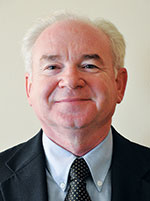Religious Education Supplement
Tebbe notes importance of voting despite candidates with “very serious flaws”
By Sean Gallagher
 The U.S. bishops have revised and issued “Forming Consciences for Faithful Citizenship” during presidential election years for decades to help Catholics prayerfully consider their participation in electing office holders from the perspective of Scripture and Church teachings.
The U.S. bishops have revised and issued “Forming Consciences for Faithful Citizenship” during presidential election years for decades to help Catholics prayerfully consider their participation in electing office holders from the perspective of Scripture and Church teachings.
Glenn Tebbe, executive director of the Indiana Catholic Conference (ICC) and the public policy spokesperson for the Church in Indiana, thinks “Faithful Citizenship” might be especially helpful in this election year where, he noted, the presidential candidates for both major parties “have very serious flaws.”
“No person is without flaws,” Tebbe said. “All of the candidates previously had their virtues and flaws. But these two candidates have very serious flaws in terms of their positions and how they might lead. I think it does pose a harder choice.”
One option that voters can consider, Tebbe said, is to not vote for any presidential candidate, an action that “Faithful Citizenship” says is a legitimate choice under certain conditions:
“When all candidates hold a position that promotes an intrinsically evil act, the conscientious voter faces a dilemma. The voter may decide to take the extraordinary step of not voting for any candidate or, after careful deliberation, may decide to vote for the candidate deemed less likely to advance such a morally flawed position and more likely to pursue other authentic human goods” (#36).
“You have an obligation to vote,” Tebbe said. “But it doesn’t mean that you have to vote for every position on the ballot. So, if you choose to not vote for somebody for a particular office, know that you have to look at the consequences that somebody else is making a choice.”
He also noted the extraordinary nature of making such a choice.
“It’s obviously an exception,” Tebbe said. “It’s taken only with due deliberation. If a person in good conscience says, ‘I can’t vote for either one,’ they are not obligated to vote for either person.”
Tebbe did encourage Catholics in Indiana, however, to vote for candidates for other offices despite how they may be troubled by candidates for president or another office.
“Don’t be discouraged by the fact that our presidential candidates are so poor,” Tebbe said. “Those aren’t the only people on the ballot. There are other positions on the ballot that are quite important and that have direct impact on our lives—as much if not more so than the presidency. Don’t let the presidential campaign discourage you from voting.”
In any case, Tebbe said that it is important for Catholics to live out their faith in society at all times, not just at election time.
“We are called to witness to our faith each day of our lives, not just during elections and not just when we’re barking about public policy or arguing with people about which direction we should go with regard to one issue or another,” he said.
“Being a disciple is not just an episodic, now-and-then kind of thing. It’s every day, all day long in the choices we make and in the witness we give to everybody.”
(A link to “Forming Consciences for Faithful Citizenship” and other related resources can be found at www.archindy.org/faithfulcitizenship.) †
Related story: ‘Faithful Citizenship’ can help Catholics form consciences for election
 The U.S. bishops have revised and issued “Forming Consciences for Faithful Citizenship” during presidential election years for decades to help Catholics prayerfully consider their participation in electing office holders from the perspective of Scripture and Church teachings.
The U.S. bishops have revised and issued “Forming Consciences for Faithful Citizenship” during presidential election years for decades to help Catholics prayerfully consider their participation in electing office holders from the perspective of Scripture and Church teachings.